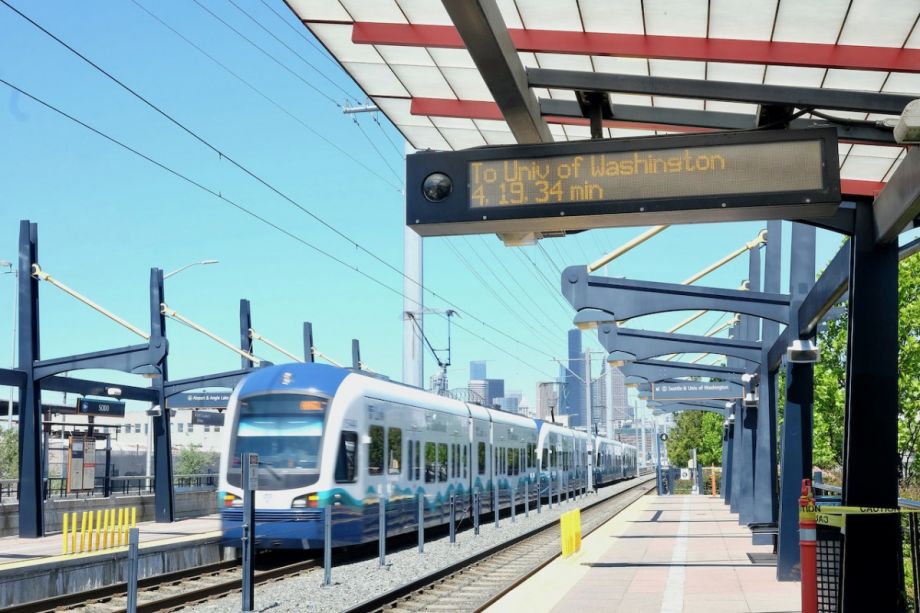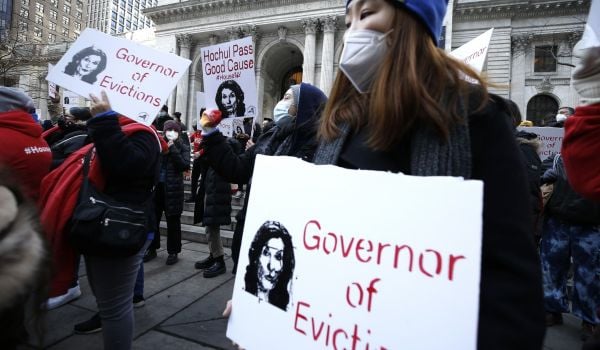Welcome to “The Mobile City,” our weekly roundup of newsworthy developments in urban transportation.
The Ultimate Economic Development Incentive: Better Transportation
Critics of the “smokestack chasing” approach to job creation in cities point out that the tax incentives and other goodies dangled in front of out-of-town corporations end up costing more than the jobs and tax dollars they bring in. But worse than that, they really play no role in swaying a company to locate in one city over another, as an essay in Bloomberg CityLab points out.
What does sway the decision? Here’s what a company’s relocation specialist told author David Zipper:
“David, did you know there is a 100-page book about how to recruit a company? […] The first 99 pages are blank, and the last page reads: ‘Where does the CEO want to live?’” (The article notes that Amazon CEO Jeff Bezos and his senior executives rejected the company’s proposed HQ2 choices of Chicago, Philadelphia and Raleigh in favor of New York and Washington. Guess where Bezos has bought residences.)
And Zipper points out in the essay that, just as CEOs opt to make their commutes shorter when deciding where to put the headquarters, cities that want to help both companies and their economies grow should invest in making their workers’ commutes shorter too by improving transportation systems to give workers easier access to more of a region’s jobs.
In the article, New York University’s Alain Bertaud points out that “bad transportation is a tax on business productivity” because it reduces the likelihood that businesses will be able to fill their job openings with workers who really want them. Berkeley labor economist Enrico Moretti backs Bertaud up, pointing out that “efficient transportation across cities lets you merge labor demand with supply.”
In other words, think of metropolitan labor markets as one big Dating Game. The better the transportation network, the bigger the pool of eligible candidates for those dates, and the happier both the suitors and the would-be employees are likely to be. And happier workers perform better on the job, and that, in turn, means fatter bottom lines for their employers. Especially if they are in highly accessible locations, which is one reason why city cores have remained desirable office locations for many companies, as the article also points out.
Free Transit Could Save Companies Money, Too
As the idea that all mass transit should be free to ride slowly spreads throughout the bodies politic of a growing number of cities, advocates sell the idea as a blow for transit equity and a way to ease the burden on the budgets of those who use transit most.
An article in the South Seattle Emerald describing where candidates in the upcoming Seattle mayoral election stand on the issue points out that another constituency could benefit from free transit: Local businesses, many of which have programs that offer free or subsidized transit passes for employees, with the companies making up the difference.
For instance, Sound Transit received nearly half of the $97 million it made directly from passenger fares in 2019 — $48 million — from employers’ business accounts. Those business expenses would also disappear with fare-free transit.
Three of the seven declared candidates for mayor of Seattle — current City Council President Lorena González, former council president Bruce Harrell and former state legislator Jessyn Farrell — have all indicated they support making Seattle transit fare-free at least in concept. Three other candidates oppose the idea, and a seventh says she needs to study the issue further before taking a position. Both Sound Transit and King County Metro, the agencies operating mass transit in metro Seattle, are opposed to fare-free transit, citing operating losses related to the pandemic that have forced delays in the region’s transit expansion program.
Fort Lauderdale Could Take Elon Musk Up on His Not-so-Mass-Transit Proposition
There are people who, when they see a bright shiny object with flashing lights dangled in front of them, go gaga over the flashing lights. As of now, flashing lights appear to be the main selling point in favor of Elon Musk’s Tesla-powered subway.
Those lights have caught the eyes of Fort Lauderdale Mayor Dean Trantalis. Apparently missing the news that Musk’s Boring Company just barely passed the throughput tests for its Las Vegas Convention Center transit system (“The Mobile City,” June 9), Trantalis called The Boring Company’s “Las Olas Loop” proposal for his city “an innovative and unprecedented approach to addressing traffic congestion and transit needs” in a June 30 tweet.
Any transit system that would make a dent in congestion in Fort Lauderdale during peak visitor season would certainly need to carry more than 4,400 persons per hour.
Tech news site The Verge cast a more skeptical eye on the proposal, noting the company’s weak performance in building transit tunnels to date.
According to The Verge, the Fort Lauderdale City Commission was to have voted July 2 on whether to take Musk up on his offer. By the time you read this, we may know whether Fort Lauderdale opted to pursue a more realistic solution for traffic congestion or was blinded by the flashing lights.
Know of a development that should be featured in this column? Send a Tweet with links to @MarketStEl using the hashtag #mobilecity.

Next City contributor Sandy Smith is the home and real estate editor at Philadelphia magazine. Over the years, his work has appeared in Hidden City Philadelphia, the Philadelphia Inquirer and other local and regional publications. His interest in cities stretches back to his youth in Kansas City, and his career in journalism and media relations extends back that far as well.
Follow Sandy .(JavaScript must be enabled to view this email address)

















Comment posted on July 12, 2021 at 5:16 p.m.
It is very true that “bad transportation is a tax on business productivity.” Unfortunately, improving transportation facilities and services does not necessarily produce the intended benefits. One example:
In a congested metropolitan region where transit provides time savings and stress relief to commuters and other travelers, reducing transit fares (or making transit free) will increase land values and rents (both residential and commercial) for places that are well-served by transit. Thus, instead of transit riders benefiting, the true benefit will go to landowners instead. (Non-transit users will pay higher rents without getting the benefit of reduced or free fares.)
To avoid this perverse result, land value return should be employed. Returning publicly-created land values to the agencies that create them will make infrastructure financially self-sustaining (at least to a greater degree than at present). It will also keep land prices and rents lower, so that transit riders and transit-accessible businesses can reap the benefits instead of having them siphoned off by landowners.
For more info, see https://www.strongtowns.org/journal/2018/2/20/financing-infrastructure-with-value-capture-the-good-the-bad-the-ugly